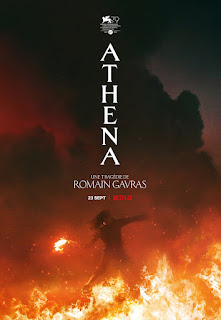Pardon my French, but the first shot of Romain Gavras’ “Athena” — a sketch of a Greek tragedy transplanted into a housing project on the outskirts of Paris — is absolutely fucking insane. Even in a digital age where dazzling long-takes have become a dime a dozen (and all too easy to fake), the oner that ignites this roman candle of a movie about a police siege on a poor neighborhood is something else. It stands out for its fiery violence, for the ground that it covers, and for the incandescent energy that explodes off the screen like the molotov cocktail that Karim (Sami Slimane) hurls into a crowd of cops and reporters who’ve gathered for a press conference at the local precinct.
The news of the day is personal for the young agitator: Karim’s 13-year-old brother has been murdered, and a video of police officers beating him to death has gone viral. It proves to be the breaking point in the tensions between the cops and the predominately Muslim French-Algerian community of Athena, and the fact that Karim’s military hero older brother Abdel (Dali Benssalah) is the man at the podium at the time of the attack doesn’t stop him from launching it.
RELATED
'The Justice of Bunny King' Review: Essie Davis Is a Mom on Fire (Again)
'Meet Cute' Review: Pete Davidson and Kaley Cuoco Interrogate the Rom-Com
Karim’s crew swarms the station at his command, going from zero to “Assault on Precinct 13” at the drop of a hat as they raid the building in search of its weapons. The euphoric image of these boys and men driving their stolen cache home along the highway as they make the short getaway drive back to the fortress-like Athena estate — their truck surrounded by motorbikes popping wheelies and fireworks being launched in every direction — is one of the most exhilarating things you’ll ever see on a movie screen. It’s the orgiastic grand finale of a shot that epitomizes Gavras’ ultra-stylish cinema of reclamation, and it’s the unambiguous high point of a film that has 80 minutes left and nowhere else to go.
Like “Our Day Will Come” and his fantastic “The World Is Yours” before it, Gavras’ “Athena” is a heightened, violent, and vaguely mythic story of a persecuted underclass getting their revenge on the system that’s wronged them; it finds the director continuing to carry his father’s torch into the 21st century with style to burn and sociopolitical gesturing in place of greater substance.
“Athena” effectively taps into the class, racial, and religious angers of modern France, which it sees as a powder keg that’s just waiting for the right spark to explode, but the film’s broad saga of brothers in crisis is so thin and symbolic that any deeper connection to the real world is sacrificed at the altar of intensity. An intensity that resists psychology, muffles sociopolitical context, and eventually swallows itself whole.
In the meantime, however, that intensity can border on the divine. The siege sequences in “Athena” — which more or less make up the entire movie — are so viscerally orchestrated that it often seems as if Gavras isn’t decrying civil war so much as he’s getting off on the carnage. The queasiness of watching a race riot staged with all the giddy ingeniousness of “The Raid 2” is only mitigated by how unrealistic the action feels amid this distressingly plausible scenario.
The archetypal nature of Gavras’ storytelling allows he and co-writer Ladj Ly (director of 2019’s similarly themed “Les Misérables”) to get away with murder. As Athen was one of the three gods involved in the feud that instigated the Trojan War, so it goes that Karim and Abdel are two of three surviving brothers who find themselves at odds as the world erupts around them. The third is a drug dealer who suddenly finds himself scrambling to salvage his goods when the police storm the project.
Moktar (Ouassini Embarek) is the eldest son and the one who seems most shaken by the loss of his family’s youngest member, but he’s also the most self-interested of the lot. That self-interest makes him something of a wild card in a story whose dynamics are often enervatingly predictable; while Karim and Abdel have conflicting views about the value of choosing violence, Moktar is a high-strung agent of chaos who always does whatever is most convenient for him. That makes him the only person capable of cooling the story’s fraternal tensions, but anyone who’s seen a Gavras movie before should know to expect that Moktar will only make things worse.
There are a handful of other major players to speak of — including pasty riot cop Jérôme (Anthony Bajon) who gets taken hostage, and the soft-spoken terrorist Sébastien (Alexis Manenti) who’s returned to France after serving a prison sentence in the Middle East and just wants to tend to his garden in peace or create massive homemade bombs, depending on what the plot demands from him at a given moment — but it’s cinematographer Matias Boucard and his crew who deserve top billing, as “Athena” is never as interested in any of its characters as it is in the camerawork around them.
This is a film that distills the most basic version of “us vs. them” into a series of ever-shifting tableaux that echo with centuries of generic historical bloodshed. A “300”-like phalanx of riot police surge towards Athena, dozens of bodies heaving together as fireworks shoot off on all sides. The wail of a children’s choir bleeds over the soundtrack, their little voices singing in Greek. Mothers and their babies scream for safe passage while legions of young men run towards danger and tear gas rolls in like a thick morning fog. Some of the tracking shots are long enough that it seems like they could stretch from one era of warfare to another.



0 Comments